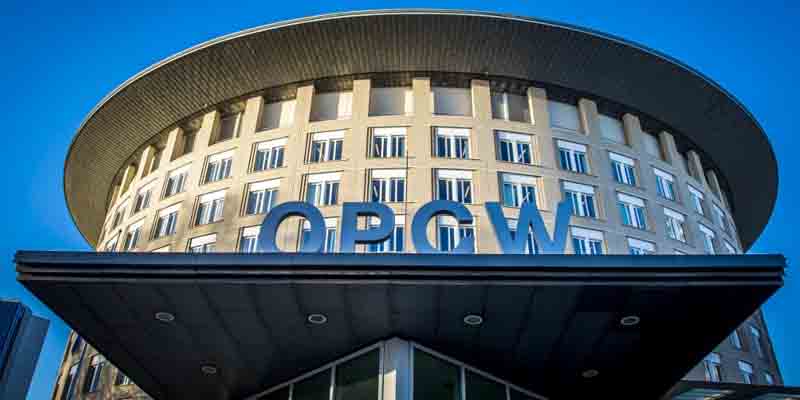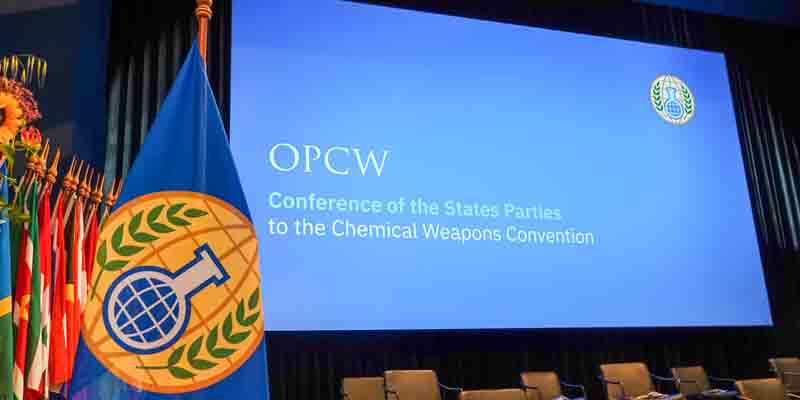- India
- Apr 23
OPCW selects CAG as its external auditor
Conference of State Parties of the Organisation for the Prohibition of Chemical Weapons (OPCW) selected India’s Comptroller and Auditor General (CAG) as its external auditor for a three-year term starting in 2021.
The appointment was made through an election process at the OPCW Conference where India received overwhelming support ahead of others to be appointed as the external auditor.
India was also selected as the member of the Executive Council of the OPCW representing Asia Group for another two-year term during the OPCW Conference of State Parties.
Organisation for the Prohibition of Chemical Weapons
The Organisation for the Prohibition of Chemical Weapons (OPCW) is the implementing body for the Chemical Weapons Convention, which entered into force on April 29, 1997.
The OPCW’s mission is to implement the provisions of the Chemical Weapons Convention to achieve our vision of a world free of chemical weapons and the threat of their use, and in which chemistry is used for peace, progress, and prosperity.
Its headquarters is situated at The Hague, Netherlands.
India is a signatory and party to the Chemical Weapons Convention (CWC).
The Convention is a universal, non-discriminatory, multilateral, disarmament treaty which prohibits the development, production, stock-piling and use of chemical weapons and monitors its elimination in order to secure a world free of chemical weapons.
Functioning of OPCW
The OPCW, with its 193 Member States, oversees the global endeavour to permanently and verifiably eliminate chemical weapons.
As the principal and plenary organ of the OPCW, the Conference of the States Parties oversees the implementation of the Chemical Weapons Convention, promotes its goals, and reviews compliance with the treaty. It also oversees the activities of the Executive Council and Technical Secretariat.
The Executive Council consists of 41 OPCW Member States that are elected by the Conference of the States Parties and rotate every two years. The Council supervises the activities of the Technical Secretariat and is responsible for promoting the effective implementation of and compliance with the Convention.
The Technical Secretariat assists the Conference of the States Parties and the Executive Council in performing their tasks and carries out the Chemical Weapons Convention’s verification measures. It also carries out other functions entrusted to it under the Convention as well as those functions delegated to it by the Conference and the Council.
The 2013 Nobel Prize for Peace was awarded to OPCW for ‘its extensive efforts to eliminate chemical weapons’.
Syria loses voting rights at OPCW
The Member States of the global chemical weapons watchdog suspended Syria’s voting rights at the organisation as a punishment for the repeated use of toxic gas by Damascus.
The vote, which required a two-thirds majority to pass, marked the first time a Member State of the OPCW has been hit with such a sanction.
The proposal was initiated by 46 out of 193 member countries on the OPCW’s governing Conference of States Parties, including Britain, France and the United States. It passed by 87 votes in favour to 15 against, meeting the required two-thirds majority of votes.
Although largely symbolic, the move sends a political signal to Syria that breaches of the 1997 Chemical Weapons Convention, which prohibits all use of chemicals on the battlefield, will not be accepted.
Syria, which joined the organisation in 2013 after being threatened with airstrikes in response to a chemical attack on the outskirts of the country’s capital, denounced the move as a propaganda tool and denied using chemical weapons.
Why did the OPCW take action against Syria?
An investigation mechanism set up by the OPCW has twice blamed Syrian government forces for chemical attacks. Last week, it said it found reasonable grounds to believe that a Syrian air force military helicopter dropped a chlorine cylinder on a Syrian town in 2018.
Last year, the team found reasonable grounds to believe that the Syrian Arab Air Force was responsible for attacks using chlorine and the nerve agent sarin in March 2017 in the town of Latamneh.
The investigative team was established after Russia blocked the extension of a joint investigation mechanism set up by the United Nations and OPCW in 2015. That mechanism accused Syria of chemical weapons attacks, including unleashing sarin in an aerial attack on the town of Khan Sheikhoun in April 2017 that killed about 100 people.
Manorama Yearbook app is now available on Google Play Store and iOS App Store


